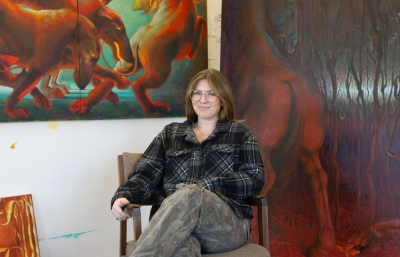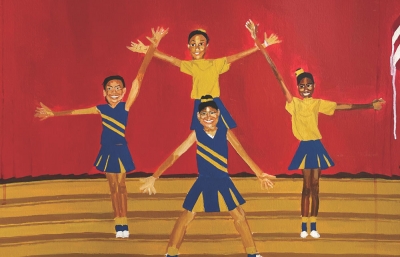Claudio Sanchez, probably best known as the frontman for progressive rock band Coheed & Cambria, is also heavily involved in the comic and art community.
His New York Times best selling comic series, The Amory Wars, depict a storyline that the band's studio albums have been based on up until the recent release of The Color Before the Sun just a month ago. I've been a geek fan for over a decade and had a chance to catch up with him recently at Aftershock Festival in Sacramento, so I asked him a few questions.
Mike Stalter: What artists are you into these days?
Claudio Sanchez: You know who I've been keeping up with a bunch now, especially on Instagram, is Jeff Soto. I remember I went to Jonathan Levine Gallery in Manhattan and got turned on to him. And now, as I keep up with him, I'm very interested in his stuff... and if he was open to doing something for one of my projects, I'd be super into that.
You worked with Christopher Shy on the Good Apollo comics, Nathan Spoor did the Afterman imagery, and now recently Nick Steinhardt did the new album cover. What's your process for curating the artists that you work with?
You know, it's just kind of what the theme of the album is. For example, this record, one of the things that happened in the process of writing it, was the destruction of my country home...it turned into this whole grow house scenario.
Which is totally one of my next questions.
Haha, yeah. My wife and I, before we were anticipating becoming parents, we wanted to make sure we were in the right situation. We had been living in the country for 7 years and thought, let's just try a couple of different locations. Let's try LA, because the business is out there, or let's try the city (NYC) because it's easier for us for work. So we put our house up for rent, and the yearly walkthrough was going to happen, and our renters had postponed it. Their story seemed to make sense. They just had their third child, yadda yadda, and so we we're like, “Okay, don't want to be too intrusive. They pay their rent on time, so no big deal.” And then, the day before the rescheduled walkthrough, the realtor texts my wife saying the house had been broken into, and that the renters are afraid and not coming back. So, the day before the walkthrough is a little suspect. We called the police and they get there, and they tell us, "Nobody is living in that house, the floors have been jigsawed apart and the place smells like Marijuana.” So sure enough, it had been turned into a grow house. There wasn't enough substantial evidence for them to actually deem it a crime scene, and you know, to go down that road made no sense for us. So we thought we’d get the insurance to cover it, but then that was another ordeal because they thought we were involved to some degree...
That you financed the whole thing? Like a Rick Ross type of deal?
Haha. And I realized from that and from having my son, that home is really wherever my family is. You know, we could be out here and I would feel comfortable. They're where I want to be, so that was sort of the theme for the album cover, where the house is sort of in shambles, and yet these ideas of comfort, the chairs are sort of floating and free-form, and could be really wherever, so we're just kind of aiming for something in that world.
I know everyone has been asking a lot about updates on The Amory Wars movie. I swear I saw on Reddit the other day that you claimed Tarantino was directing it. That has to be a joke, right?
No, no, no… totally a joke!
Is that something that's sort of moving in the direction you want it to be moving or is it kind of at a stand still?
You know, it's at a stand still to be completely honest. Who knows, I feel like one moment there's this excitement and you feel like something's going to happen, but you can’t count your chickens, because the minute you do, it just goes to the sidelines and there it waits. And that's really where it's been a waiting game.
You've referred to yourself as a comic book author. The written element of the creative process is so ingrained in your music. Do you purposefully stage the elements of the storyline to go along with the music? Sort of in reverse, do you change the writing of the story because of something you had an idea for in the music?
Oh, yeah. Most of the time, I’ll utilize my personal experiences to fuel the ideas inside the fiction. And music will really kind of help that. When I have these, what i consider the dots, the music will really sort of help connect those dots. If I understand that, in point A this happens, and in point B there’s a sort of conclusion, the music will really help bridge those two things.
I was at that Evening with Coheed and Cambria show at Irving Plaza in NYC in 2005, the one where there was no opener. You guys did an acoustic set and then came out and played basically everything you had recorded up through that time over the next few hours.
Oh, hell yeah!
I've always wondered, is that the show that sparked the idea for doing the later Neverender series of concerts where you came out and played every album in its entirety over consecutive nights?
Oh, absolutely. That definitely the foundation to what would become Neverender, for sure. Those were some of my favorite shows in this band. One in particular, was at the Metro, it was either the first or second of that run. That was the show that solidified that this was an idea that we could run with and makes sense for us.
I read that you're most creative in the middle of the night, like at 4AM. How has living in the city impacted your ability to be creative?
It was hard. That's what this whole record is kind of about. I love living in the city. I don't drive, really, so living in a city with public transportation everywhere, it's beautiful… my dream come true. I'm surprised I didn't move into the city earlier in my life. But yes, working in it, for me, is a little difficult. I'm up at 4 in the morning, and that's when I'm most inspired, and I can't do anything in that hour. I'm in Park Slope, but I had a little rehearsal room in Gowanus and I'd go over there around that time, and I don't know, there was something about it… even in my own space, I felt uninspired. That room was uninspiring. I like working in my comfort zone, in my house, so working in my apartment at 4 in the morning would have been great, but instead I had to work in human hours of the day and so that made for an interesting record. I had this sense of exposure that I hadn't had in the past. Working in a house out in the country, super secluded, I could sort of get in my own head and do my own thing, but now in this apartment situation, it wasn't like that. I was super insecure. I could hear my neighbors. I know they could hear me. And if you're recording, most of the time, everything is in the headphones, so the only thing the neighbors are hearing is vocals and there's no context…
You just sound like a crazy person…
Exactly! So, I'm just like, arghhh...the less crazy I could make it, the more comfortable I felt. That's what became the record.
You totally broke the mold, no storyline this time. Did the storyline become it's own wall for your writing?
It did. You mean The Amory Wars?
Yes, did you get to a point where it was, “I don't even know what to do with this, so I'm just going to do something different?”
No, for me it was like, with The Afterman, it ends on such a poetic, romantic note. This character realizes that his wife is sort of lost in the afterlife, and he decides to return to help her transcend from one level to the next. And, that was the question that we were left with when that record was over. The character, Sirius Amory, returns to the Keywork to find his wife. That's all we're left with. Part of me was thinking, “I have a story that can conclude that.” Then I thought, “It's beautiful the way it is, without all the details.” It's romantic and poetic enough that he went back there for her despite all the things they sort of endured through the record. So, I could continue telling that. I just thought, this album, for me, with the birth of my son, with all the things I endured, it just made sense to pull back the curtain this time. Now was the right time to do it.
And do you think you'll continue on that path of maybe not getting back to the story for a while?
You know, we'll see. I love writing conceptual music. It's fun for me, so I'm definitely going to return to that formula, for sure, but it's nice to know that we can do this, too.
















